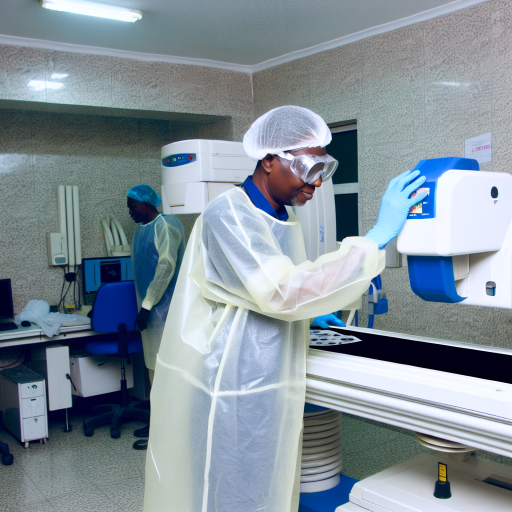Introduction
Overview of the Healthcare Landscape in Nigeria
Nigeria’s healthcare system faces numerous challenges, but innovative medical disciplines revolutionizing healthcare offer hope for transformative change.
Limited access to quality care affects millions.
High disease burdens, including malaria and HIV, persist across the country.
Many hospitals struggle with inadequate resources and staffing.
Urban areas often see better facilities compared to rural regions.
Overall, the system requires innovative solutions to meet public health needs.
Importance of Exploring Emerging Medical Disciplines
Emerging medical disciplines offer new solutions for Nigeria’s healthcare challenges.
These fields leverage technology, research, and innovation.
They can improve patient outcomes and efficiency in healthcare delivery.
For instance, telemedicine bridges gaps in healthcare access.
Advanced surgical techniques enhance treatment capabilities.
Exploring these disciplines can transform traditional healthcare practices into modern, effective systems.
Purpose of the Blog Post
This blog post aims to highlight innovative medical fields.
These fields are revolutionizing healthcare in Nigeria.
We will discuss disciplines like telemedicine, genomics, and digital health.
Each of these areas holds promise for improving the healthcare landscape.
Recognizing these advancements can inspire further investment and interest.
Stakeholders must embrace these changes to overcome existing challenges.
By showcasing these disciplines, we aim to encourage collaboration among healthcare professionals, policymakers, and the public.
Basically, exploring cutting-edge medical disciplines is vital.
They present opportunities for reshaping healthcare in Nigeria.
By staying informed, we can drive progress and improve health outcomes for all.
The Rise of Telemedicine
Definition and significance of telemedicine
Telemedicine refers to the remote diagnosis and treatment of patients via telecommunications technology.
This approach allows healthcare providers to connect with patients without physical visits.
It can reduce travel time and costs for patients significantly.
Moreover, telemedicine enhances access to healthcare services in underserved areas.
It empowers patients to seek immediate medical attention from the comfort of their homes.
Growth of telemedicine in Nigeria
Nigeria has witnessed remarkable growth in telemedicine over the past few years.
The rise of mobile phones and internet connectivity has fueled this expansion.
According to recent studies, over 85% of Nigerians now own mobile devices.
This allows for increased access to telehealth services.
The COVID-19 pandemic accelerated the adoption of telemedicine across the country.
Key statistics:
- Over 30 telemedicine platforms launched in recent years.
- Telemedicine consultations increased by over 200% during the pandemic.
- Over 50 million Nigerians accessed telehealth services in the past year.
Healthcare professionals have also embraced telemedicine.
Many hospitals and clinics now integrate telemedicine into their practices.
This development allows for better patient management and monitoring.
Additionally, local governments have started supporting telehealth initiatives.
They aim to reach remote and rural areas where healthcare access is limited.
Case studies of successful telemedicine initiatives
Several telemedicine initiatives in Nigeria showcase its potential effectiveness.
These case studies highlight both individual and systemic success in healthcare delivery.
LifeBank
LifeBank is a Nigerian health tech company offering telemedicine services.
They connect patients with certified doctors through mobile apps.
This initiative has improved patient outcomes dramatically.
Mobihealth
Mobihealth is another successful telemedicine platform.
It provides services like online consultations and health monitoring.
Their platform connects patients to healthcare professionals instantly.
Telemammy
Telemammy specializes in maternal and child health.
They offer teleconsultations for expectant mothers.
This initiative has greatly improved prenatal healthcare accessibility in Nigeria.
Benefits and challenges faced by telemedicine providers
Telemedicine offers numerous benefits but also presents challenges.
Benefits:
- Increased access to healthcare services, especially in rural areas.
- Reduced waiting times for consultations and prescriptions.
- Cost-effective solutions for both patients and providers.
- Enhanced continuity of care for chronic disease management.
- Improved patient satisfaction through convenience.
Despite these advantages, telemedicine providers face several challenges:
Challenges:
- Lack of infrastructure in remote areas, limiting access.
- Patient hesitance due to unfamiliarity with technology.
- Regulatory issues surrounding telemedicine practices.
- Concerns regarding data privacy and security.
- Limited internet connectivity in certain regions.
In fact, the rise of telemedicine offers significant potential to revolutionize healthcare in Nigeria.
As technology continues evolving, telehealth can bridge the gap in healthcare access.
The country’s success stories and ongoing initiatives signify a promising future.
Addressing the challenges will be crucial for lasting success.
Stakeholders must collaborate to expand telemedicine further.
By doing so, Nigeria can ensure a healthier future for all its citizens.
Advances in Precision Medicine
Precision Medicine and Its Principles
Precision medicine represents a significant shift in healthcare.
It focuses on customizing medical treatment for each patient.
By considering genetic, environmental, and lifestyle factors, this approach transforms traditional healthcare models.
It aims to move away from the “one-size-fits-all” approach.
Physicians now analyze various aspects of individuals’ health, including:
- Genetic variations
- Biomarkers
- Family history
- Environmental exposures
- Lifestyle choices
This customization allows healthcare providers to predict, prevent, and treat diseases more effectively.
Each patient’s unique profile guides clinicians in selecting the best therapies.
As a result, precision medicine improves healthcare outcomes significantly.
Current Developments and Research in Nigeria
Nigeria has embraced precision medicine in recent years.
Several initiatives focus on integrating genetic research into medical practices.
Researchers are exploring various diseases prevalent in the country, including:
- Hypertension
- Diabetes
- Infectious diseases
- Cancers
- Sickle cell disease
Institutions like the Nigerian Institute of Medical Research (NIMR) are leading the charge.
They conduct studies to understand genetic factors affecting disease outcomes.
Collaborations with international organizations enhance their capacity to deliver precision medicine approaches.
Additionally, universities in Nigeria are integrating genomics into their curricula.
This move trains future healthcare professionals in precision medicine principles.
Ongoing projects aim to collect genomic data from diverse populations.
This data will help develop tailored treatment protocols for major diseases.
Potential for Precision Medicine to Enhance Treatment Outcomes
The potential of precision medicine in improving treatment outcomes is immense.
By utilizing personalized strategies, patients receive therapies that suit their specific conditions.
This targeted approach often results in higher efficacy and fewer side effects.
For instance, in cancer treatment, precision medicine enables oncologists to:
- Select drugs based on genetic profiles
- Identify the most effective therapies early
- Reduce unnecessary treatments
- Monitor treatment responses accurately
Furthermore, precision medicine promotes preventative strategies.
Through genetic testing, individuals can learn about their risk profiles.
This knowledge helps in adopting lifestyle changes to mitigate risks.
Precision medicine also enhances medication adherence.
Patients understand their therapies better when treatments are tailored to their profiles.
Consequently, this understanding leads to improved health outcomes.
Collaborations Between Hospitals and Research Institutions
Collaborations between hospitals and research institutions play a crucial role.
These partnerships facilitate the integration of research findings into clinical practice.
Hospitals benefit from the latest innovations while researchers gain access to real-world data.
Some key collaborations in Nigeria include:
- The partnership between the Koladaisi University and NIMR on genomics
- Collaboration between the University of Lagos and Harvard University for infectious disease studies
- Joint projects involving Nigerian hospitals and the Wellcome Trust
Such collaborations yield numerous benefits, including:
- Shared resources for better research outcomes
- Access to cutting-edge technology
- Training opportunities for healthcare professionals
- Increased funding and grant opportunities
Ultimately, these partnerships aim to bridge the gap between research and patient care.
Healthcare practitioners receive ongoing education and access to new insights.
Patients benefit from improved diagnostic tools and treatment options.
In short, advances in precision medicine mark a turning point for healthcare in Nigeria.
By embracing a personalized approach, the country is setting the stage for significant medical breakthroughs.
The ongoing research, collaborative efforts, and focus on unique patient profiles promise to reshape treatment methodologies.
As Nigeria continues to invest in precision medicine, improved health outcomes become a reality.
Read: Why Emergency Medicine is Critical to Nigeria’s Healthcare Future
The Role of Artificial Intelligence in Healthcare
Overview of AI Technologies in Medical Practice
Artificial Intelligence (AI) has emerged as a transformative force in healthcare.
Various technologies drive this revolution, including:
- Machine Learning: Enables systems to learn from data and improve over time.
- Natural Language Processing (NLP): Assists in understanding and processing human language.
- Robotics: Automates surgical procedures and enhances precision.
- Image Recognition: Analyzes medical imaging for accurate diagnostics.
- Predictive Analytics: Predicts patient outcomes and manages chronic diseases effectively.
These technologies work synergistically to enhance patient outcomes and efficiency in healthcare delivery.
Healthcare professionals can harness AI’s power for data-driven decision-making.
This ability to utilize large datasets improves diagnosis, treatment planning, and patient management.
Applications of AI in Diagnostics and Patient Care
AI impacts numerous areas in diagnostics and patient care.
Some notable applications include:
- Diagnostic Imaging: AI algorithms analyze X-rays, MRIs, and CT scans quickly.
They assist radiologists in identifying diseases early, such as cancers and fractures. - Predictive Analytics: Leveraging patient data, AI predicts disease progression.
This proactive approach helps in managing conditions like diabetes and heart disease. - Smart Health Assistants: Virtual assistants provide personalized health advice.
They help patients manage medications and remind them of appointments. - Telemedicine: AI powers virtual consultations, improving access to healthcare.
This technology makes healthcare more reachable, especially in rural areas. - Clinical Decision Support: AI systems analyze patient data in real-time.
They provide recommendations to physicians during patient evaluations and treatment.
The applications of AI bring several benefits.
Enhanced accuracy in diagnostics reduces human error.
AI systems process vast amounts of health data, recognizing patterns invisible to the human eye.
Consequently, patients receive timely and appropriate interventions.
Examples of AI-Driven Projects in Nigerian Healthcare
Nigeria is embracing AI in its healthcare system.
Various projects showcase the effectiveness of AI technologies:
- Deep Learning for Image Analysis: Nigerian researchers are developing algorithms that analyze medical images.
They aim to improve cancer detection rates across hospitals. - Predictive Analytics in Public Health: The Nigerian Ministry of Health collaborates with AI firms.
They use predictive models to prevent disease outbreaks through analysis of environmental and health data. - Telehealth Services: Startups in Nigeria offer AI-driven telemedicine platforms.
These services connect patients with healthcare providers seamlessly. - Electronic Health Records (EHR): Hospitals implement AI-enhanced EHR systems.
These systems streamline patient data management and improve care coordination.
These initiatives show Nigeria’s dedication to leveraging technology in healthcare.
Importantly, they provide examples of how AI can address local health challenges effectively.
The integration of AI supports Nigeria’s goal of achieving Universal Health Coverage (UHC) by enhancing healthcare access and quality.
Ethical Considerations and Data Privacy Concerns
While AI brings numerous benefits, it also raises ethical concerns.
Key issues include:
Transform Your Career with Expert Guidance
Get personalized mentorship consulting that’s tailored to your unique path. Our expert advice is actionable and exclusive.
Get Started- Data Privacy: The processing of patient data raises confidentiality concerns.
It’s paramount that organizations prioritize data security. - Bias in Algorithms: AI systems may inherit biases from training data.
Ensuring diverse and representative datasets is crucial to avoid inequity in healthcare delivery. - Accountability: Questions arise regarding responsibility in case of errors.
Establishing clear guidelines around AI usage is essential to address this concern. - Transparency: Patients must understand how AI tools influence their care.
Clear communication about AI applications builds trust in healthcare providers.
To address these concerns, stakeholders must implement strong regulatory frameworks.
Policies must emphasize ethical practices while encouraging innovation.
Striking a balance is vital for fostering a responsible AI ecosystem in healthcare.
In essence, AI technologies are shaping the future of healthcare in Nigeria and globally.
Applications in diagnostics, patient care, and telemedicine revolutionize healthcare delivery.
The Nigerian healthcare system’s proactive approach to AI integration showcases potential benefits.
However, it is crucial to tackle ethical and data privacy concerns.
Stakeholders must prioritize patient safety and uphold the highest ethical standards.
Only then can they unlock AI’s full potential in improving healthcare outcomes.
Read: Top Medical Disciplines Every Nigerian Student Should Consider

Innovations in Regenerative Medicine
Introduction to Regenerative Medicine and Its Applications
Regenerative medicine focuses on repairing or replacing damaged cells, tissues, and organs.
It harnesses the body’s natural healing processes.
This field combines biology, engineering, and materials science.
Its applications include various diseases and injuries.
Regenerative medicine aims to treat conditions that are currently incurable.
These may include spinal cord injuries, degenerative diseases, and heart diseases.
Key Institutions and Research in Nigeria Focusing on Regenerative Therapies
Nigeria is making strides in regenerative medicine through various institutions.
Some key organizations include:
- National Institute for Medical Research (NIMR): This institute conducts research on treatments for various health conditions.
- University of Lagos College of Medicine: This college explores stem cell research and its applications.
- Obafemi Awolowo University: Researchers here investigate tissue engineering and regenerative therapies.
- Ahmadu Bello University: They focus on regenerative approaches for chronic diseases.
These institutions foster collaboration among scientists, clinicians, and government bodies.
They also facilitate conferences and workshops to share knowledge.
Increased funding and support have enhanced research opportunities.
The Nigerian government actively promotes advancements in this groundbreaking field.
Case Studies Demonstrating Successful Regenerative Treatments
Several successful case studies highlight the potential of regenerative medicine in Nigeria.
One notable example involves a patient with severe osteoarthritis.
Traditional treatments failed to alleviate their pain.
Researchers utilized stem cell injections into the affected joint.
The patient experienced significant pain relief and improved mobility.
Another case involved diabetic ulcers in a middle-aged woman.
Conventional wound care was ineffective.
A team from a leading hospital applied tissue-engineered skin grafts.
This innovative treatment facilitated healing and restored the patient’s quality of life.
Furthermore, a research group focused on spinal cord injuries.
They evaluated the use of neural stem cells to promote regeneration.
Early results indicated promise in restoring motor function.
These cases exemplify the transformative potential of regenerative medicine.
They also underscore the importance of ongoing research and clinical trials.
Future Prospects for Regenerative Medicine in Improving Health Outcomes
The future of regenerative medicine in Nigeria looks promising, driven by key advancements.
- Advancements in Stem Cell Research: Ongoing studies push breakthroughs in treating chronic diseases and injuries.
- Regulatory Framework Development: Establishing clear regulations will accelerate therapy approvals, ensuring safe, effective treatments.
- Public Awareness: Increased awareness will lead to greater acceptance of regenerative therapies among patients and professionals.
- International Collaboration: Partnering with global research institutions will enhance knowledge and innovation in the field.
- Investment in Biotechnology: More funding will spur growth and development in regenerative medicine technologies.
Regenerative medicine can address Nigeria’s health crisis, offering new hope for patients facing chronic illnesses and injuries.
It reduces long-term healthcare costs by treating and preventing conditions early.
Researchers are also exploring gene therapy to correct genetic disorders, leveraging Nigeria’s biodiversity to discover new treatment resources.
Education plays a vital role in maximizing regenerative medicine’s potential.
By training scientists and healthcare professionals, Nigeria can build the expertise needed to foster innovation and treatment breakthroughs.
Collaboration between public and private sectors will be crucial to pooling resources and knowledge for greater impact.
Regenerative medicine promises to redefine healthcare in Nigeria, improving patient outcomes with groundbreaking therapies.
Embracing this innovation can address pressing health challenges, creating a healthier future for all citizens.
In general, regenerative medicine holds immense potential to transform Nigeria’s healthcare, offering advanced solutions for chronic diseases and reducing overall costs.
Read: Top Science Disciplines Revolutionizing Research in Nigeria
The Impact of Mobile Health (mHealth) Technologies
Definition and Significance of mHealth
Mobile Health, or mHealth, refers to the use of mobile devices to support healthcare practices.
This includes smartphones, tablets, and wearable devices.
mHealth serves various functions like health monitoring, data collection, and telemedicine.
It has significantly influenced healthcare delivery models, especially in developing countries.
In Nigeria, mHealth offers innovative solutions to long-standing health challenges.
These technologies enhance accessibility, affordability, and efficiency of health services.
Popular mHealth Applications Used in Nigeria
Several mHealth applications have gained popularity in Nigeria, addressing diverse healthcare needs.
Here are some notable applications:
- mDoc: This platform connects patients with healthcare providers.
It offers telemedicine services and promotes chronic disease management. - HealthConnect: This app helps in data collection and patient management.
It allows health workers to access patient records easily. - Positively Nigerian: Aimed at HIV patients, this app provides treatment adherence support and educational resources.
- mHealth4U: This platform focuses on maternal and child health.
It provides reminders for vaccinations and prenatal checkups. - MyCare: This app allows users to schedule medical appointments.
It also sends medication reminders to improve treatment compliance.
The presence of these applications demonstrates Nigeria’s commitment to integrating technology in healthcare.
This trend leads to improved patient outcomes and increased healthcare access.
Case Studies Showcasing mHealth Effectiveness in Rural Areas
mHealth technologies have proven particularly effective in rural areas of Nigeria.
Below are critical case studies highlighting these successes:
- Project mHealth: Maternal Health Intervention: This program utilized SMS reminders for antenatal visits.
Results showed a 30% increase in attendance for checkups. - Community Health Information System: This initiative provided health workers with mobile tools to record patient data in real-time.
It improved data accuracy and reporting significantly. - Telemedicine Network in Ogun State: This network connected patients to specialists via mobile platforms.
It made consultations more accessible for those living far from clinics. - Vaccination Campaign Using Mobile Alerts: In a vaccination campaign, text messages increased participation by 40%.
Parents received reminders about immunization schedules through their phones. - HIV Mobile Counseling Service: Mobile counselors reached rural areas to offer testing and counseling.
This intervention led to increased HIV testing rates by over 50%.
These case studies provide excellent evidence that mHealth can meet healthcare needs in underserved areas.
Moreover, they highlight the potential to save lives and improve community health.
Challenges and Barriers to Widespread mHealth Adoption
Despite the benefits of mHealth, several challenges hinder widespread adoption in Nigeria.
Addressing these barriers is crucial for maximizing the potential of these technologies.
The primary challenges include:
- Limited Internet Access: Many rural areas lack reliable internet connectivity.
This limitation restricts mobile health service usage. - Low Literacy Rates: A significant portion of the population struggles with basic literacy.
This affects their ability to understand and utilize mHealth applications. - Regulatory Challenges: The absence of clear regulations concerning mHealth hinders the growth of innovative solutions.
Policymakers need to establish guidelines to promote development. - Data Privacy Concerns: Patients are often wary of sharing their personal health information.
Ensuring data security can build trust in mobile health solutions. - Digital Divide: Socio-economic disparities limit access to smartphones and mobile devices.
Addressing this gap is essential for equitable healthcare.
Overcoming these challenges requires collective efforts from stakeholders in the healthcare sector.
Policymakers, tech companies, and health organizations must work together.
They can foster an environment conducive to mHealth adoption.
Therefore, mHealth technologies have the potential to revolutionize healthcare in Nigeria.
Their applications address critical health issues, particularly in rural populations.
By showcasing success stories, it is evident that mHealth can improve health outcomes.
However, addressing the challenges associated with these technologies is crucial for scalability and sustainability.
Read: Pharmaceutical Disciplines Driving Innovation in Nigeria
The Evolution of Mental Health Services
Overview of Mental Health Issues in Nigeria
Nigeria faces a profound mental health crisis.
Numerous individuals suffer from mental health disorders.
Unfortunately, only a fraction receive adequate treatment.
According to estimates, about 20-30% of Nigerians experience mental health issues.
Yet, stigma and lack of awareness hinder most from seeking help.
Common mental health disorders in Nigeria include:
- Anxiety disorders
- Depression
- Bipolar disorder
- Schizophrenia
- Substance use disorders
The societal impact of these issues is staggering.
Families experience significant emotional and financial strain.
Communities often lack resources to accommodate affected individuals.
Mental health has historically received limited attention in the Nigerian health system.
Emerging Disciplines Focused on Mental Health Care
Nigeria’s mental health services have undergone notable changes.
Emerging disciplines play a crucial role in transforming the landscape.
Professionals in psychology, psychiatry, social work, and counseling have gained importance.
These fields develop tailored approaches to meet diverse needs.
Innovative practices include:
- Psychotherapy: Techniques like cognitive-behavioral therapy (CBT) help patients manage symptoms.
- Teletherapy: Online counseling now reaches individuals in remote areas.
- Psychiatric rehabilitation: Programs support reintegrating individuals into society.
- Community psychology: Focuses on broader social factors affecting mental health.
These disciplines aim to reduce the stigma surrounding mental illness.
They educate communities about mental health and promote understanding.
Training programs equip healthcare workers with skills to support individuals effectively.
Impact of Community-Based Programs and Interventions
Community-based programs significantly improve mental health services in Nigeria.
These initiatives empower local communities to take charge of mental health care.
They also enhance awareness of mental health issues.
Key community programs include:
- Peer support groups: These groups foster connections among individuals with shared experiences.
- Educational workshops: Workshops teach community members about mental health and coping strategies.
- Mobile clinics: These clinics reach underserved areas, providing essential services and resources.
- Collaboration with local organizations: Partnerships with NGOs help scale and sustain interventions.
The impact of these programs is profound.
They promote early detection and treatment of mental health disorders.
Additionally, they reduce stigma and encourage individuals to seek help.
Community involvement leads to sustainable improvements in mental health outcomes.
Importance of Integrating Mental Health into Primary Care
Integrating mental health into primary care services is vital.
This approach ensures comprehensive healthcare for all Nigerians.
Primary care settings are often the first point of contact for individuals seeking help.
Benefits of this integration include:
- Improved access to mental health services: Patients can seek treatment without stigma.
- Holistic care: Addressing physical and mental health in one setting enhances overall well-being.
- Early intervention: Identifying mental health issues early can prevent severe consequences.
- Collaboration among healthcare providers: A team approach ensures coordinated care.
Health practitioners are crucial in this integration process.
They must receive training to recognize and treat mental health disorders.
This training helps them confidently address patients’ needs.
The Nigerian government has taken steps to improve mental health services.
The Mental Health Policy outlines goals and strategies for integration.
This policy aims to promote mental health awareness and foster collaboration across sectors.
In a nutshell, Nigeria is witnessing significant changes in its mental health landscape.
Emerging disciplines are addressing the challenges faced by individuals with mental health issues.
Community-based programs are creating impactful interventions that empower local populations.
Moreover, integrating mental health into primary care services ensures a holistic approach to healthcare.
While challenges remain, the commitment to improving mental health services is evident.
By continuing to prioritize mental health, Nigeria can revolutionize its healthcare system.
The future holds promise for individuals living with mental health disorders across the country.
Collaboration and Policy Development
The Role of Government and Policy-Makers in Promoting Medical Innovations
Government plays a critical role in fostering medical innovations.
By establishing supportive policies, they create a conducive environment.
Effective regulations facilitate quicker adoption of new technologies.
Furthermore, the government can provide financial incentives for research and development.
Policy-makers must also prioritize funding for innovative health projects.
They can allocate budgets specifically for advanced medical research.
This investment can lead to breakthrough treatments and technologies.
Moreover, creating a clear regulatory framework simplifies the approval process for new innovations.
Public health policies should focus on integrating cutting-edge disciplines into healthcare.
By updating existing regulations, they smooth the transition for new technologies.
Additionally, collaboration with stakeholders ensures diverse perspectives are considered.
Public-Private Partnerships Transforming Healthcare Delivery
Public-private partnerships (PPPs) can drive significant improvements in healthcare.
These collaborations pool resources and expertise from both sectors.
They enable innovative solutions to address healthcare challenges effectively.
Some benefits of PPPs include:
- Increased investment in healthcare infrastructure.
- Access to advanced technology and expertise.
- Improved service delivery in underserved areas.
- Risk-sharing between public and private entities.
Through these partnerships, Nigeria has experienced valuable transformations.
They have facilitated the establishment of modern healthcare facilities.
Additionally, they have fostered training programs for healthcare professionals.
Examples of Successful Collaborative Projects in Nigeria
Several successful collaborative projects showcase the power of partnership.
These initiatives have proven beneficial in enhancing healthcare services.
- HealthReach Initiative: This project connects private hospitals with government health facilities.
It aims to deliver comprehensive healthcare services to grassroots communities. - Innovate Healthcare Nigeria: A collaboration between tech firms and hospitals, it integrates technology into patient management.
This initiative has significantly improved patient data management. - Nigeria Integrated Health Program: This program unites various health stakeholders.
It enhances maternal and child health outcomes through community-based interventions. - Private Sector Health Alliance: This organization engages private companies in the fight against diseases.
It has secured funding for immunization and disease prevention projects.
Such examples demonstrate how collaboration can elevate healthcare delivery in Nigeria.
They highlight the importance of synergy between public and private sectors.
Future Policy Recommendations for Supporting Cutting-Edge Disciplines
For Nigeria to sustain its healthcare transformation, it needs strategic policy recommendations.
These measures will ensure continued support for advanced medical disciplines.
Streamline Regulatory Processes
The government must simplify regulatory requirements for new medical technologies.
By creating efficient approval channels, innovators can bring solutions to market faster.
Enhance Funding for Medical Research
Increased financial investment in medical research is imperative.
Allocating more funds will stimulate innovation and attract experts to Nigeria.
Promote Capacity Building in Healthcare
Training programs for healthcare professionals are crucial.
Policymakers should advocate for continuous education in cutting-edge disciplines.
Foster International Collaborations
Engaging with international organizations will expand Nigeria’s reach.
Partnerships with global institutions can provide technical expertise and resources.
Support Healthcare Startups
Government incentives for healthcare startups can spur innovation.
Providing grants or tax breaks encourages entrepreneurship in the health sector.
Advocate for Telemedicine Expansion
Telemedicine has the potential to revolutionize healthcare delivery.
Policies enabling its broader implementation can improve access to care, especially in remote areas.
Establish Health Innovation Hubs
Creating dedicated hubs for health innovation can stimulate collaboration.
These spaces can foster partnerships among researchers, entrepreneurs, and healthcare providers.
Public Awareness Campaigns
Raising public awareness about health innovations is essential.
Educating citizens on available medical technologies can enhance acceptance and utilization.
Collaboration and policy development are crucial for advancing healthcare in Nigeria.
The government and its partners must work together to foster innovation.
By implementing strategic policies, they can support cutting-edge medical disciplines.
Together, they can redefine the healthcare landscape and significantly improve health outcomes.
The future of healthcare in Nigeria looks promising, thanks to these collaborative efforts.
Conclusion
Recap of the innovative medical disciplines discussed
In this blog post, we explored various cutting-edge medical disciplines.
Telemedicine transforms access to healthcare across Nigeria.
Precision medicine offers personalized treatment plans based on genetics.
Robotics enhances surgical accuracy and efficiency.
Additionally, digital health tools improve patient monitoring and data analysis.
All these innovations are reshaping healthcare delivery in Nigeria.
Vision for the future of healthcare in Nigeria
The future of healthcare in Nigeria holds great promise.
With ongoing advancements, we can expect improved patient outcomes.
Enhanced access to services will elevate healthcare equity.
Integration of these new disciplines will streamline care processes.
A robust healthcare system can emerge that meets diverse needs effectively.
Ultimately, the Nigerian populace will benefit from these innovations.
Call to action for stakeholders to support advancements in healthcare
Healthcare stakeholders must unite to support these advancements.
Policymakers should create frameworks that encourage innovation.
Investors must provide funding for emerging medical technologies.
Healthcare providers must embrace new methodologies and technologies.
By collaborating, we can develop a sustainable healthcare ecosystem in Nigeria.
Everyone’s involvement is crucial for realizing these transformative goals.
Importance of continuous education and adaptation to new medical trends
Continuous education is vital in the rapidly evolving medical landscape.
Healthcare professionals must stay informed about new advancements.
This ongoing learning will foster adaptability and resilience within the sector.
By prioritizing education, we ensure that healthcare providers offer the best possible care.
It’s critical to remain open to change, embracing trends that enhance patient welfare.
Only through education can Nigeria’s healthcare system truly revolutionize.




